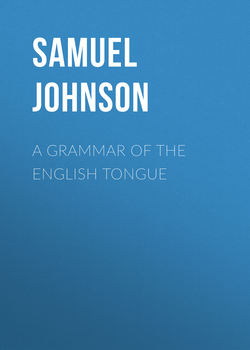Читать книгу A Grammar of the English Tongue - Samuel Johnson - Страница 1
A GRAMMAR OF THE ENGLISH TONGUE
ОглавлениеGrammar, which is the art of using words properly, comprises four parts: Orthography, Etymology, Syntax, and Prosody.
In this division and order of the parts of grammar I follow the common grammarians, without inquiring whether a fitter distribution might not be found. Experience has long shown this method to be so distinct as to obviate confusion, and so comprehensive as to prevent any inconvenient omissions. I likewise use the terms already received, and already understood, though perhaps others more proper might sometimes be invented. Sylburgius, and other innovators, whose new terms have sunk their learning into neglect, have left sufficient warning against the trifling ambition of teaching arts in a new language.
Orthography is the art of combining letters into syllables, and syllables into words. It therefore teaches previously the form and sound of letters.
The letters of the English language are,
To these may be added certain combinations of letters universally used in printing; as, fl, ff, fi, ffi, ffl, and &, or and per se, and.
Our letters are commonly reckoned twenty-four, because anciently i and j as well as u and v were expressed by the same character; but as those letters, which had always different powers, have now different forms, our alphabet may be properly said to consist of twenty-six letters
Vowels are five, a, e, i, o, u.
Such is the number generally received; but for i it is the practice to write y in the end of words, as thy, holy; before i, as from die, dying; from beautify, beautifying; in the words says, days, eyes; and in words derived from the Greek, and written originally with υ, as sympathy, συμπαθεια, system, συστημα.
For u we often write w after a vowel, to make a diphthong; as, raw, grew, view, vow, flowing; lowness.
The sounds of all the letters are various.
In treating on the letters, I shall not, like some other grammarians, inquire into the original of their form, as an antiquarian; nor into their formation and prolation by the organs of speech, as a mechanick, anatomist, or physiologist; nor into the properties and gradation of sounds, or the elegance or harshness of particular combinations, as a writer of universal and transcendental grammar. I consider the English alphabet only as it is English; and even in this narrow disquisition I follow the example of former grammarians, perhaps with more reverence than judgment, because by writing in English I suppose my reader already acquainted with the English language, and consequently able to pronounce the letters of which I teach the pronunciation; and because of sounds in general it may be observed, that words are unable to describe them. An account, therefore, of the primitive and simple letters, is useless, almost alike to those who know their sound, and those who know it not.
